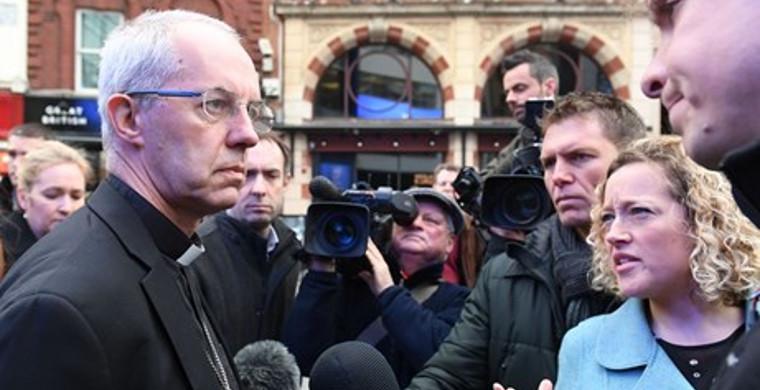UK: Archbishop apologises as new abuse allegations come to light
by Madeleine Davies
Church Times
Feb. 2 2017
FOTO: Archbishop Welby speaks to journalists after appearing on Nick Ferrari's LBC breakfast programme, at Global Radio studios, London, on Thursday
THE Archbishop of Canterbury has apologised "unequivocally and unreservedly" for the Church of England's failures to all survivors of abuse, after Channel 4 News reported abuse allegations against John Smyth QC, a former chairman of the Iweren Trust, a charity that ran Christian holiday camps for public-school students.
Archbishop Welby was a Dormitory Officer at Iwerne holiday camp in the late 1970s, when Mr Smyth was one of the leaders. A statement from Lambeth Palace said that the Archbishop worked with Mr Smyth, but that no one had discussed the allegations with him.
"I was completely unaware of any abuse," the Archbishop told LBC radio, on Thursday. "I never heard anything at all at any point. I never had the slightest suspicion that there was anything going on."
A six-month Channel Four News investigation found that both the Trust and Winchester College had learned of allegations of abuse in the 1980s but failed to report them to the police. One man told the programme that he and other boys had been beaten so badly that they had to wear nappies to staunch the bleeding.
The statement on behalf of the Archbishop said: "We recognise that many institutions fail catastrophically, but the Church is meant to hold itself to a far, far higher standard and we have failed terribly. For that the Archbishop apologises unequivocally and unreservedly to all survivors."
One man said that he grew so fearful of the beatings that he tried to take his own life in 1981. This prompted the Iwerne Trust to launch an investigation, and compile a confidential report, written in 1982, seen by Channel 4 News.
It described what it called the "beatings" of 22 young men.
"The scale and severity of the practice was horrific. . . eight received about 14,000 strokes: 2 of them having some 8000 strokes over three years."
A "senior figure" in the Trust wrote to Mr Smyth, telling him to leave the country. He went on to live in Zimbabwe, and then South Africa.
In its statement, Lambeth Palace said that the Archbishop knew that Mr Smyth had moved overseas but, "apart from the occasional card, did not maintain contact with him".
In August 2013, the Bishop of Ely, the Rt Revd Stephen Conway, wrote to the Archbishop of Cape Town, Dr Thabo Makgoba, informing him of concerns expressed to his diocesan safeguarding adviser about Mr Smyth from an alleged survivor. The British police had been notified. The Archbishop's Chaplain at the time was forwarded this letter, and subsequently showed it to the Archbishop for information only.
"The Archbishop has repeatedly said that he believes that the safeguarding of children and vulnerable adults should be a principle priority in all parts of the Church, and that any failings in this area must be immediately reported to the police," the Lambeth Palace statement says. "The Archbishop is on the record as saying that survivors must come first, not the Church's own interests. This applies regardless of how important, distinguished or well-known the perpetrator is."
The Titus Trust, which absorbed the Iwerne Trust in 2000, told Channel 4 News: "It was only in 2014 that the board of The Titus Trust was informed about this matter, after which we submitted a serious incident report to the Charity Commission and provided full disclosure to the police. The allegations are very grave and they should have been reported to the police when they first became known in 1981."
"We utterly condemn this behaviour and abuse of power and trust," the Church of England's National Safeguarding Adviser, Graham Tilby, said. He said that his predecessor had helped to find support for the survivors.
"Clearly more could have been done at the time to look further into the case," he said. "We now have a dedicated central team made up of six full-time posts. We will be reviewing all files, making further enquiries as necessary." He urged anyone with further information to go to the police.
When Channel 4 News put the allegations to Mr Smyth on camera, he said: "I'm not talking about what we did at all." He called some of the claims nonsense, and declined to respond to further requests.
END














